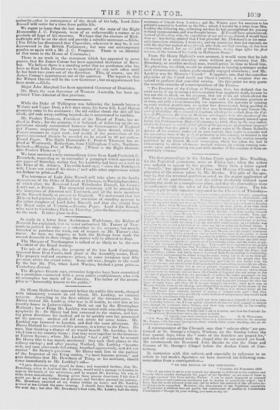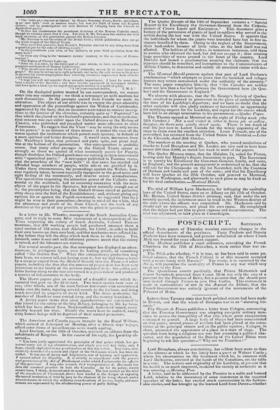The first proceediugs in the Arches Court against Mrs. Woolfrey,
for the Papistical gravestone, were on Friday last ; when the widow was ordered to appear by her proctor. Since then, a letter signed " Sewells," has appeared itt the Times and Morning Chronicle, in ex- planation of the course taken by Mr. 13reeks. The pith of the apo- 10:4y is, that the reverend gentleman acted on the urgent application of era tain of his parishioners ; that the widow abrolutely insisted upon placing the stone ill a conspicuous place, and that the proceedings were in conformity with the rules of the Ecclesiastical Courts. The fol. lowing rs ply to this statemeut appeared in the Cios,lifi:?-2 of Thursday.— - ss;_ts th, le I 'wive:ye a letter writhe, hy • Sewell:: purporting to 1„..a do.f .1;ii t If 1,11.... Wi• 11111.4 fall ration to ,t11 mankind, and I",- mit lirel'y Mr lit state fo.• I. . ' would :to it trie • statement of facts in my mind 1114111 - . • ist, ;liii il•• :I ',Li ilS I ant in London
I sliiiilla slIi% ise these Mas.e.. Sew el. . Lee e,e,2. one nill.1 I,new, if toe take their E./ ii ) 1101 to assert alit thiug a- -• !eat is 11,11, ill 1,l,i 1.11;41iS11,111 eitil prove.
The■ t:i -v :ill! the Atom..., at ill(' : eel N •ks. ttore worthy od credit
fol.I net 1 At such, these Me,rs. S.•-• . .•• , . 1. - o- credit. Now, per-
k ys the pat,lia it ill givti me t lit, ' . • . st 1., •• 1 'titer of the late Mr. Joseph NN otolftey, whose widow i so e‘st•eatett it, t it • tile 1.,:tott ial Court of Arches. It- r tits they it ill credit me when I so tue eseowes sister indite, as a Catholic, was fi roldeen it tie. sacred word 01 God to erase one iota ot what she believed disioe. I ate the per5.41 WIIU till Olt her that tlectritse, lint that ought to have been cited before the Atelies t' taut a tto,s extreell. excess.' Bet as to Messrs. Sew I I s' Col feet ' statement of rams' they oeIght, if they w ishosi t, i,-,naey to ntlo to the mina of the taildie, to have stated flott toy brother was: their chief 'ii '01(01 in polities ; that it hem., er the■ abused his religion he thought proper to deletel it ; that he had exposed them and their fami- lies as placeltulters osinecoires) —gosenters of Cartsbruoke rants, and the ladies as pot- tresses and sweepers of the castle yard, Sze. 'lids would loose explaitte,1 to the people of I.nglatel wily and wherefore Mrs. Woolfrey, widow.. was to be seleCtel is rile butt of parsactition. they should have told the people of England, through the Times, that Mrs, Woolfrey, widow, had lately beep:. le a convert from Protestantism to Catholicity. and had been instritmental in others doing the same, being led to do so by their pH- site judgment, These Messrs. Sew ells should have intormed the people that the Ii ev..t ell. I. :11r. Meeks had givote iliS permission, provided he was secure from his Bishop's eenture,atel ulso that the Itisltaptleclitred he had nothing to olo with the affair,
and conseetiently my sitter It to act its 1/11Varti should direct her. Yea.. should Said 011ly t,1tittittns si1* given by the It ishett or 'Kasen ; and as those
opinions were on doctrine, and we knew the Church of England was toot averse to the dot'' rifle of praying for the ,lea I, we prestuned —or rather the widow presumed—in her afflictions. Slessrs. Sew ells should has e told us that the Reverend Mr. Weeks had received his fees by his officers the that of erection, a at demanded A second lee tiller the lapse of eight days, out then let it reatain traitoptil six weeks, until such tueu a. Mes.srs. Sewells wrote to the 111410p, tont obliged hint to take part in the shame of the age. II oil these gentlemen said the tomb of Mr. Woolfrey arils erected where all his Catholic friends were interred, inslead ef saying a • conspictions part •—had they &dared the inset iptions were peculiarly small instead of conspicuous, they would have been more in tiecorolance with truth.
" That the Reverend Mr. Breeks would nut have concerned himself, if left to mut- sett; t readily believe; for, if I tom rightly inturteed, he has not duty enough to fatigue him, though he possesses titre., livings, and list's very comfortably in the country. away from all the annoyences of a congn•gat ion. " Begging to unsure Messrs. Sewells that I am in London, and that the Catholic In- atitute ut Great Britain loose taken the cause in hand, " I remain, your roost obedieut sere-3111, fee. II. 1%. WOOLF/rEY•
" Near Mr. Woolfrey's tombstone there is a tombstone erected to the memory Mr. Barites, with the some inscription, these tweetydliree years staudiug, and no ob- jection has ever been made."
A correspondent of the Chronicle says that" solemn obits" are per- formed at St. George's Chapel, Windsor, on the Sunday before the four quarter days, when the " souls of the founders are prayed for," anti when all connected with the chapel who do not attend are fined. He recommends the Reverend John Breeks to cite the Dean and Canons of St. George's Chapel before the Arches Court of Can- terbury.
In connexion with this subject, and especially in reference to an article in last week's Spectator, we have received the following com-
munication from a correspondent-
" TO THE zotroa OF THE SPECTATOR.
"Croydon, 4th November 183Et.
" '1 Ii.. faith pr.aralgated at Oxford ' by Messrs. New Man, Posey, leetile, and others, is no ' new faith ' even in modern times; but was tie faith of many old English divines ; and its promulgators are only desirous of bringing back the Church to Apostolical posit y.
" It does not countenance the prominent doctrines of the Roman Catholic creed, though its enemies assert that it does. Far from it, Mr. New man has written the best book, certainly, of this generation. against the Homan heresies.
"Mr. Newman is not the editor of the Britids Critic; which publication does not go the whole length of the Oxford Tracts. " Does your first quotation from Fronde's Remains amount to any thing more than &question put for the sake of eliciting n reply ? " lithe parenthesis your own, or the author's, in your third quotation from the same book ?
" Is there any thing in the ' monastic sy stem' contrary to the doe'rines of Protes- tantism ?
'The Bishop of Chester I give up.
"After all, you seem, by the latter part of your article, to have no objection to the pompous ceremonials of Homan Catholicism. " Why should you sneer ut the Vicar of C,rivbrooke, as 3 on do in your last para- graph? lie may be acting upon right principle. and using the only means in his pots sr to prevent his rustic congregation from receiving erroneous impressioas from church- yard inscriptions. " I hope you will not consider those remarks impertinent. I have for some time been a reader of the Spectator ; anti have become squeamish in newspaper articles, and hate quite a keen eye for unjust paragraphs written in a spirit of party. "I am our constant reader, J. M. L."
On the theological points mooted by our correspondent, we cannot enter into any controversy : we think a newspaper an truth medium for such discussions. In the passages quoted from Fronde we made no alteration. The object of our article was to expose the gross absurdity and oppression of the proceedings against the Widow of Carisbrooke, aggravated by the facts, that no measures were taken to remove inscrip. tions in the interior of the churches, certainly quite us " Pupistical " as that which she placed on her husband's gravestone, and that no ecclesias- tical censure was cast either upon the Oxford divines or the Bishop of Chester, who published and preached matter more offensive to strict Protestants. To suggest that the Vicar "may be using the only means in his power," is no defence of those means: it makes the case all the worse against the institutions which permit such tyranny, in default of a more spirituel and better discipline. It would seem, moreover, from Woolfrey's letter, that personal and party spite, not pious zeal, was at the bottom of the persecution. Our correspondent is probably aware, that many other passages in the Oxford Tracts savour as strongly as those we quoted of what commonly passes fur Popery, though doubtless the Oxford gentlemen see nothing in them inconsistent with "apostolical purity." A newspaper published in Taunton states, that the preaching of the "new fuith " in that town has startled and offended large numbers of people, while others are gratified by it. Under these circumstances, the proceedings against the Widow, how- ever regularly taken, become especially repugnant to the good sense and right feeling of the community, and deserve severe animadversion. The speculation respecting the attractive power of the Catholic cere- monial on the multitude, had no necessary connexion with the main !object of the paper in the Spectator, but grew naturally enough out of it ; the presumption being, that the Oxford divines aimed at gathering stray sheep into the fold of the Establishment : and, without giving any opinion for or against the Popish ceremonial, we suggested that they might be wise in their generation—bearing in mind all the while, that the advantage and profit of Me State Church, not the ti ink of any doctrine or the piety of any practice, was the point in question.



























 Previous page
Previous page